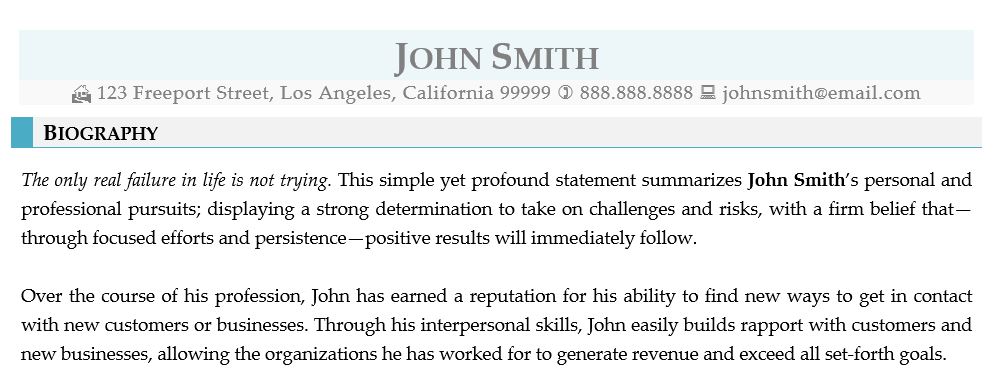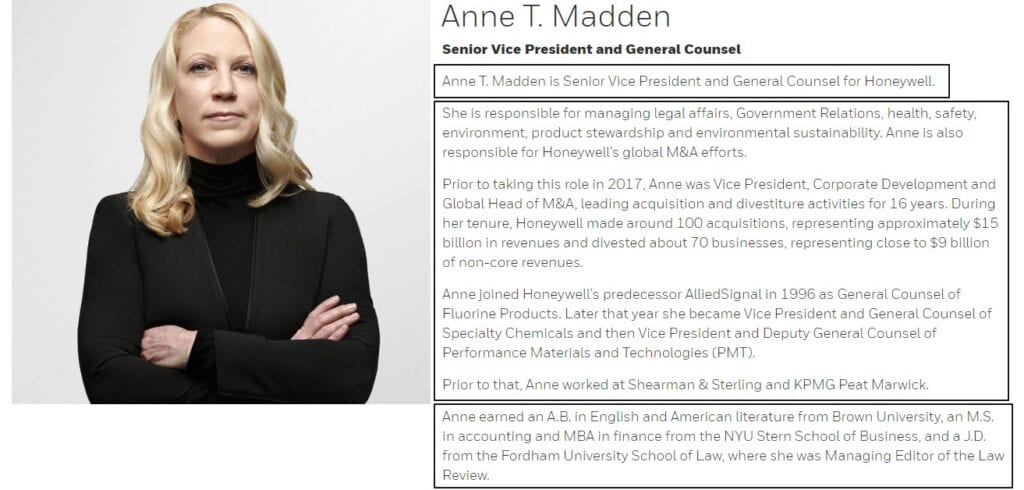How to Write a Personal Bio for Work
The COVID-19 pandemic has changed the economic landscape, and we're still unsure how long we'll be feeling its effects. But we're sure that looking for work, switching careers, and enticing new clients will be tough, since there's more competition than normal. A resume can only fit so much; you have passions, values, and unique experiences that influence your work.
Enter the professional biography.
In today's job market, this written tool can play an integral part in one's job search. So, before we discuss how to write a professional bio or where we can find the best professional bio examples, let's talk about the basics first. What is a professional bio? Do you need one?
What is a professional biography, and why do you need one?
A professional bio talks about yourself, your work, and influences on your work. It serves to compel readers into contacting you. This written tool is a narration of your professional background. This is how it differs from regular biographies: A typical biography aims to evoke emotion and keep its readers' attention, written to make the subject more personable to the audience. Professional biographies, on the other hand, have a similar goal, but the audience is composed of companies, potential clients, and fellow professionals.
A professional bio is useful regardless of experience level. Entry-level employees can overcome their lack of experience with a well-written biography that sheds light on what they can offer. Conversely, seasoned professionals can further highlight their areas of expertise and professional accomplishments.
What is the difference between a professional bio and a resume objective?
A resume objective is formal and written objectively. They don't contain "personal" content such as a person's beliefs. It is also written to present information succinctly.
Meanwhile, a professional bio is looser in structure and is more informal in tone. While it also summarizes your professional background, it is written in a narrative form and contains personal touches. It can serve as a complement to your resume.

How do you write a short professional bio?
Before we delve into professional bio examples, here are tips on how to write one. First, you want to keep your bio simple. Simple isn't bad; you can tell a strong story with simple sentences if you can weave those sentences into a cohesive narrative. Here's a video guide to help you write a compelling professional bio:
Before writing your bio, consider if you want to write in a more professional or more casual manner. Take a few factors into account, such as your field, title, and intention. Choose what you think is more effective in selling yourself.
We can divide the contents of a short professional bio into three parts:
1. Introduction
2. Professional Background
3. Personal details
These are not hard separations, but a general guide in arranging the information in your biography.
Introduction
- Introduce yourself and any companies you want to associate with your name.
- If you don't work for a company, introduce your personal brand.
Establish who you are. Introduce yourself in the beginning part of your bio.
Professional Background
Explain what you do. You don't have to summarize your professional experience. Simply elaborate on your current title(s) and the duties that come with it. Assume that readers don't know what roles your titles entail.
Mention your professional accomplishments here, especially those relevant to your current role. When written well, this lends credence to your skills. You don't need to specify your skills if this part is well-written; your career highlights can speak for themselves.
High-level professionals may add any previous roles and their respective accomplishments here. For beginners in the field, consider adding any strong roles you've had within organizations.
Make sure that your additions are relevant to your narrative. For instance, if you are trying to establish your medical expertise, it's not a good idea to add non-medical achievements unless they played key roles to strengthen your medical accomplishments.
Personal Details
Explain how you do what you do well. This is the humanizing element to your professional bio. In this part you may share your values, beliefs, and passions (and how they influence your work ethic). If you increased successful dog adoptions in your local humane society, consider including this sentence in your professional bio to make it more impactful:
After adopting Maxie, an old German Shepherd who went through three homes and five years alone in an animal shelter, I made it my mission to ensure that every dog up for adoption gets a loving family that fits their unique personality and needs.
You may also add any degrees you have here, especially if they are relevant to your area of expertise. These additions will further establish your credibility.
Lastly, you may add a few personal details in the last sentences of your professional bio. These will help make you relatable to your audience. You want not only to impress your readers, but also to connect with them. You want them to contact you.
Don't forget to add any social media profiles or e-mail addresses that your readers can use to contact you.
Professional Bio Examples
If you're still unsure about how to write one, take a look at the professional bio examples we've provided below. We've also added divisions for the three general parts of a professional bio.
1. Company Website (example: Anne T. Madden | Honeywell)

Anne Madden has a standard professional biography for a company executive, but that's not a bad thing.
Her introduction is straightforward, because the meat of her biography is in the second to fourth paragraphs. She informs the reader of the roles that her titles entail. Her previous work is also stated here, presented with concrete evidence of her success. It is a strong showing of her competence.
Lastly, she lists her degrees from various well-respected institutes to further establish her credibility.
2. Personal Brand (example: Nandini Jammi)

Nandini Jammi's about page, while more focused on her work, is still a good example of a professional bio.
Her introduction is greatly emphasized, and for good reason: Co-founding a consultancy that regularly works with Fortune 500 companies is very impressive. She also includes her identity as an activist in the first sentence of her biography. This informs the reader that her beliefs are a strong influence on her work.
The second part of her biography narrates how she got immersed into her area of expertise. She also states how her campaign Sleeping Giants won awards and became a catalyst for a global movement in the world of brand safety and content moderation.
Lastly, she mentions her previous experience in marketing and her degree. She also has links to her social media accounts.
While there's not many explicit mentions of her beliefs, we can infer that she's very keen on fighting against discrimination and believes that it has no place in marketing. We can see this in her elaboration of Sleeping Giants and the #StopHateForProfit campaign.
3. Long Bio (example: Joaquin Duato | Johnson & Johnson)

Joaquin Duato's writeup is one of the best professional bio examples, a long written tool that still keeps a tight narrative. Every sentence has a purpose; they only add to his credibility and keep the readers' attention.
The first set of boxed-off text is his introduction. It showcases his current and previous roles and establishes him as a leader in the healthcare sector, his area of expertise.
The second set of text expounds on his duties and especially his accomplishments within Johnson & Johnson. There is clear proof of his impact within the company that further cements his credibility in the field.
Finally, the last set of text gives us insight into what he brings to the company. In this case, he offers a unique perspective that comes from his personal experiences and history as a dual citizen and leadership in global healthcare organizations. We also see that his values directly influence his actions outside of work.
4. Short Bio (example: Dennis Krawec | Personal Brand)

Dennis Krawec's professional biography shows that very short biographies can still be effective.
His introduction establishes his specializations as a creative artist. It's simple, but impressive nonetheless. The second paragraph briefly showcases his successes in his area of expertise that lend credence to his introduction. Lastly, he ends off on a personal touch by including one of his hobbies and interests. Also note the links to his social media profiles, similar to Nandini's.
Showcase your strengths with a professional biography of your own
Competition is tough now more than ever. If you'd like to strengthen how you present yourself to prospective clients or employers, Resume Professional Writers offers professional biography writing services and other supplementary services. Let the experts deal with showcasing your strengths and skills. Get in touch with us today!
How to Write a Personal Bio for Work
Source: https://www.resumeprofessionalwriters.com/professional-bio-examples-tips/
0 Response to "How to Write a Personal Bio for Work"
Post a Comment